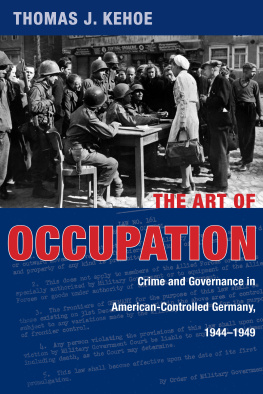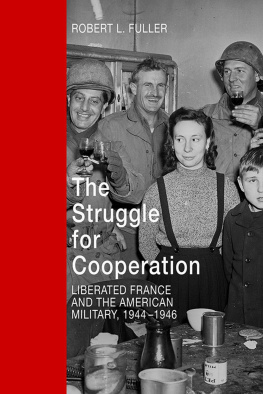
The Art of Occupation
WAR AND SOCIETY IN NORTH AMERICA
Series Editors: Ingo Trauschweizer and David J. Ulbrich
Editorial Board
Janet Bednarek
Michael W. Doyle
Nicole Etcheson
Joseph Fitzharris
John Grenier
John Hall
Paul Herbert
James Westheider
Lee Windsor
Hero of the Angry Sky: The World War I Diary and Letters of David S. Ingalls, Americas First Naval Ace, edited by Geoffrey L. Rossano
Protecting the Empires Frontier: Officers of the 18th (Royal Irish) Regiment of Foot during Its North American Service, 17671776, by Steven M. Baule
Citizen-General: Jacob Dolson Cox and the Civil War Era, by Eugene D. Schmiel
Veteran Narratives and the Collective Memory of the Vietnam War, by John A. Wood
Home Front to Battlefront: An Ohio Teenager in World War II, by Frank Lavin
The Art of Occupation: Crime and Governance in American-Controlled Germany, 19441949, by Thomas J. Kehoe
THE ART OF OCCUPATION
Crime and Governance in American-Controlled Germany, 19441949
Thomas J. Kehoe
OHIO UNIVERSITY PRESS
ATHENS
Ohio University Press, Athens, Ohio 45701
ohioswallow.com
2019 by Ohio University Press
All rights reserved
To obtain permission to quote, reprint, or otherwise reproduce or distribute material from Ohio University Press publications, please contact our rights and permissions department at (740) 5931154 or (740) 5934536 (fax).
Printed in the United States of America
Ohio University Press books are printed on acid-free paper 
29 28 27 26 25 24 23 22 21 20 195 4 3 2 1
Library of Congress Cataloging-in-Publication Data
Names: Kehoe, Thomas J., 1980- author.
Title: The art of occupation : crime and governance in American-controlled Germany, 1944-1949 / Thomas J. Kehoe.
Other titles: Crime and governance in American-controlled Germany, 1944-1949
Description: Athens, OH : Ohio University Press, [2019] | Series: War and society in North America | Includes bibliographical references and index.
Identifiers: LCCN 2019014946| ISBN 9780821423820 (hbk. : alk. paper) | ISBN 9780821446812 (pdf)
Subjects: LCSH: Military government--Germany (West) | Police--Germany (West)--History. | Crime--Germany (West)--History. | Criminal justice, Administration of--Germany (West)--History. | Germany--Social conditions--1945-1955. | Germany--History--1945-1955.
Classification: LCC DD257.2 .K37 2019 | DDC 940.087/4--dc23
LC record available at https://lccn.loc.gov/2019014946
For my beautiful daughter Maeve Eleanor, 20172019
Contents
Proclamations, Ordinances and Laws Issued
by Allied Military Government in Germany
Acknowledgments
As with many first books, the nascent idea for this project was formed years ago, which means that many people added constructively to my thinking or helped me bring this to completion in some other fashion. From the very beginning of my graduate studies at the University of Sydney in 2010 I was interested in occupation, though my curiosity extended beyond analyzing such events purely as military exercises. No matter the duration, a period of occupation is profound in the histories of the occupied and the occupiers alike. Allied control of Germany after World War II is an excellent case in point. It affected nearly every facet of daily life for people in Germany, including the social and political order as well as the economy.
There has been a great deal written on this history, and it took me significant time to find an avenue for this book. It is therefore a credit to my various instructors that I could ultimately contribute to our knowledge of this history. I have my supervisors from the University of Sydney, Professors A. Dirk Moses and Robert Aldrich, to thank for first pushing me to think creatively about craft, narrative, argument, and the current relevance of the past. My doctoral supervisors at the University of Melbourne, Dr. Steven Welch and Professor Barbara Keys, in equal measure gave me the freedom and constraint that allowed me chart an interdisciplinary approach to writing histories of crime and governance, which ultimately became the basis of this book. They pointed me toward new sources of data and a new way of thinking about the interactions between social and intellectual history. I credit both of them with forcing me to adopt the sort of focus necessary for completing a doctoral dissertation and pursuing a career in research. The subsequent advice of the doctoral examiners they selected to review my thesis, Professors Adam Seipp (Texas A&M) and Petra Goedde (Temple University), was instrumental to shaping this quite-different book that grew from my doctoral thesis. For that, I also have to thank the editorial team at Ohio University Press and the reviewers for offering constructive ideas that pushed me to refine my thinking.
This book would not have been possible without a number of benefactors. The aid of a research fellowship from the German Academic Exchange Service (Deutscher Akademischer Austauschdienst, DAAD) was crucial. In 2013, the DAAD funded my primary research in Germany. I thank Dr. Margit Szllsi-Janze at the Ludwig Maximilian University of Munich for sponsoring me to travel to Germany and the Geyer family who hosted me in Munich. (Herr Geyer often very patiently listened to me as I rambled about my days research, gently correcting my German, asking intriguing questions, and sharing his favorite drinks.) Nor would this project have come to fruition if my first post-PhD employer, Professor Michael Wilmore at Swinburne University of Technology, had not supported my continued pursuit of historical research, despite its not explicitly being part of my role. I wrote the first book proposal while in that position.
The award of a postdoctoral research fellowship by the University of New England was critical. It allowed me the time and financial security to spend hours rethinking, redrafting, and ultimately honing the work that follows. For that position, I have to thank Professor Richard Scully for shepherding the application through its various stages. He has also proved an excellent sounding board during my tenure in the department. Thank you to Professors Klaus Neumann, Adam Seipp, and A. Dirk Moses for reading drafts of the book proposal and offering valuable constructive criticism.
There are many personal relationships that influenced my work. My father helped me photograph documents, and he ultimately constructed some of the statistical characterizations of crime that are referenced in this book. My mother was always encouraging of higher-degree study and first suggested an academic career long before I ever considered the option seriously. But most importantly, I have to thank my wife, Dr. Elizabeth Greenhalgh, who shared with me the challenges and excitements of pursuing graduate studies. She has been an invaluable source of support, a sounding board, and an excellent writing partner on a number of occasions. She also tolerated my working long hours as I endeavored to finish this book. For that sacrifice and all the many other ways that she has shown her support, I will be eternally grateful.
Introduction
Friedrich Wilhelm had just broken a US Army telephone wire when American soldiers happened on him outside of Nuremberg in early May 1945. Classified as an act of sabotage under the US martial law governing occupied Germany, it was a serious offense. If convicted by an American military court, Wilhelm faced the potential sentences of any fine, term of imprisonment, or even death. Making things worse for him, heavier punishments were more likely because the Allies feared resistance. Though nearing an end, the war was still ongoing, and the Americans were on alert for Nazi partisans, especially around Nuremberg, which had been significant to Hitlers movement and was only captured two weeks earlier following an unexpectedly difficult battle.
Next page








